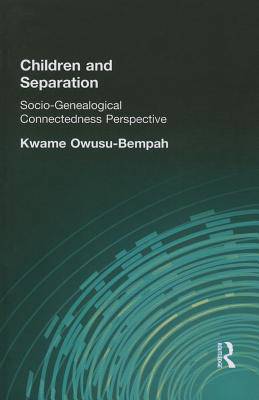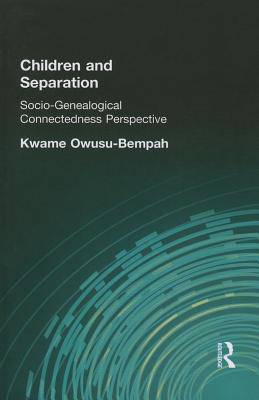
- Afhalen na 1 uur in een winkel met voorraad
- Gratis thuislevering in België vanaf € 30
- Ruim aanbod met 7 miljoen producten
- Afhalen na 1 uur in een winkel met voorraad
- Gratis thuislevering in België vanaf € 30
- Ruim aanbod met 7 miljoen producten
Children and Separation
Socio-Genealogical Connectedness Perspective
Kwame Owusu-BempahOmschrijving
Childhood separation and loss have become virtually a way of life for a large number of children throughout the world. Children separated from their genetic parent(s) and consequently their genealogical, social and cultural roots due to processes such as adoption, parental divorce/separation, donor insemination, single parenthood by choice and child trafficking can face social, emotional and psychological difficulties.
This book explores the premise that a proper understanding of the complex inner world of modern day separated children and their psycho-social development requires a shift in focus or emphasis. It presents the notion of socio-genealogical connectedness as a new theoretical framework for studying and promoting these children's growth and development. This new theory simultaneously challenges and complements existing notions of psycho-social development, including attachment theory and Erikson's psycho-social theory of personality development. Owusu-Bempah proposes that this sense of socio-genealogical connectedness is an essential factor in children's adjustment to separation and their emotional and mental health; much like those adopted, separated children suffer a loss of genealogical continuity, and hence, loss of 'self'. This hypothesis is discussed and ultimately supported through both the author's own research and a broad selection of theoretical and empirical material from other areas.
The book further considers the implications of this notion of socio-genealogical connectedness for childcare policy and practice, as well as directions for future research in this and related fields. Children and Separation is an invaluable resource for academics, students and childcare professionals. The accessible style of the book ensures that it will also be useful to parents and anybody affected by childhood separation.
Specificaties
Betrokkenen
- Auteur(s):
- Uitgeverij:
Inhoud
- Aantal bladzijden:
- 208
- Taal:
- Engels
Eigenschappen
- Productcode (EAN):
- 9780415646529
- Verschijningsdatum:
- 15/08/2014
- Uitvoering:
- Paperback
- Formaat:
- Trade paperback (VS)
- Afmetingen:
- 152 mm x 226 mm
- Gewicht:
- 294 g

Alleen bij Standaard Boekhandel
Beoordelingen
We publiceren alleen reviews die voldoen aan de voorwaarden voor reviews. Bekijk onze voorwaarden voor reviews.











